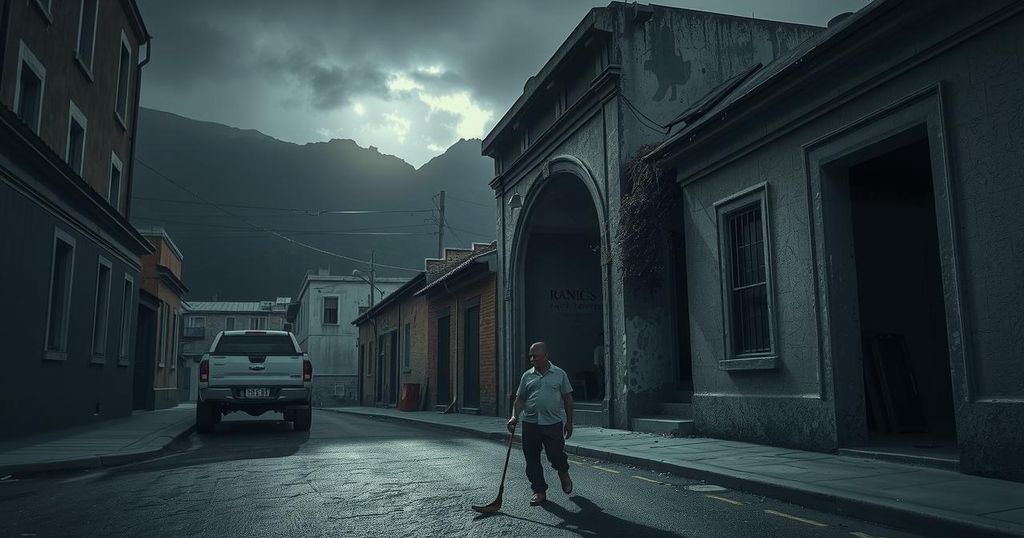Crime
AFRICA, CAPE, CAPE FLATS, CYRIL RAMAPHOSA, DA, DAVIN, DEVON, DEVON AFRICA, FAMILY, GARETH NEWHAM, GOFUNDME, HUMAN INTEREST, INSTITUTE FOR SECURITY STUDIES, JESUS, JOHANNESBURG, JUSTICE AND VIOLENCE PREVENTION PROGRAMME, KELLY AMBER, MURDER, SOUTH AFRICA, UND, UNDEAN, VIOLENCE, WESTERN CAPE
Fatima Alavi
0 Comments
South Africa’s Gang Warfare: The Victims Caught in the Crossfire in Cape Town
Cape Town’s gang violence continues to devastate communities, as evidenced by the tragic loss of children, like Davin Africa. Despite governmental efforts to combat this cycle of crime, gang culture persists, fueled by societal neglect and drug trade. Community leaders like Pastor Engel work tirelessly to mediate gang conflicts and support rehabilitation, offering a glimmer of hope amidst overwhelming despair.
In Cape Town, South Africa, communities are enduring the terrifying effects of gang warfare, particularly evident in the Cape Flats area. The violence is palpable, illustrated by the heartbreaking story of Devon Africa, who lost his four-year-old son, Davin, in a crossfire shooting. This tragedy is not isolated, as gang violence has claimed the lives of many, including Davin’s older sister, Kelly Amber, just two years prior; she was only 12 years old.
The violence persists despite police assurances of heightened patrols following the establishment of a special unit by President Cyril Ramaphosa in 2018 to combat gang-related crime. The Western Cape province, home to the Cape Flats, consistently records the highest number of gang-related murders in the country. Experts stress that a deep-rooted culture of gangs thrives in these neglected communities, providing the social services that the state fails to offer, including food, electricity funds, and even school fees.
Pastor Craven Engel, who works fifteen kilometers away in Hanover Park, is dedicated to mediating gang conflicts and curbing escalating violence fueled by drug trade. He argues that the societal issues stemming from apartheid continue to afflict communities, leading to addiction and family breakdown. “The substance creates unemployment, robbery, and gang fights over territories,” Engel states, as he attempts to navigate and mitigate the ongoing cycle of violence.
Engel’s work is challenging, especially with gangs continually recruiting young members. He meets with community leaders and gang leaders alike, seeking to broker peace and ceasefires. However, these ceasefires are often fragile, lasting only a matter of days before violence reignites. Engel acknowledges the harsh reality: “What’s terrible now is there are more children involved in gangs, recruiting from ages eight to fifteen.”
Support for rehabilitation programs is lacking, and Engel relies on charitable donations to fund his community initiatives aimed at steering individuals away from gang life. Young men like Fernando “Nando” Johnston are seeking an escape from the gang lifestyle. Nando hopes to break the cycle of violence that has engulfed his family, stepping into a two-to-twelve-week rehabilitation program led by Engel. “In this game, there are only two options – jail or death,” Nando admits, desperate for a change.
As Nando begins his journey with Engel, his mother, Angeline April, is filled with both hope and trepidation. She expresses her deep desire for him to seize this opportunity for a better future, knowing firsthand the hardships of raising children in a gang-afflicted environment. “Make the best of this opportunity, Nando,” she pleads, reflecting the struggles faced by many families.
Two weeks into the program, progress is tangible. Engel reports that Nando is participating actively, visiting family without drugs in his system, indicating a potential shift toward stability. Yet, in stark contrast, home to Devon and Undean remains a site of unrelenting despair, as violence rages around them, making survival an uphill battle.
The dynamics of trust between the community and police complicate matters further; residents feel unsure whether help will arrive when needed, leading many to refrain from reporting crimes. “They don’t know the police will come,” Newham points out, underlining a breakdown of trust.
Ultimately, Pastor Engel captures the sentiment of many when he states, “Nobody is going to come and save us. We need to build resilience and hope within our communities ourselves.” His words, both a rallying cry and a sober reminder, echo throughout the beleaguered neighborhoods of Cape Town, where hope is a scarce but occasionally flickering light amid widespread trauma.
In summary, Cape Town’s gang warfare has inflicted immeasurable suffering on families, exemplified by the heartbreaking losses of Devon Africa’s children. Despite government initiatives aimed at combating this violence, the challenges remain significant. Community leaders like Pastor Engel strive to foster peace amidst chaos, battling not just against gangs but also the systemic issues that allow them to thrive. While progress is slow and fraught with difficulty, stories of rehabilitation and hope, like that of Nando Johnston, illustrate the potential for change amid a backdrop of despair.
Original Source: www.bbc.com




Post Comment